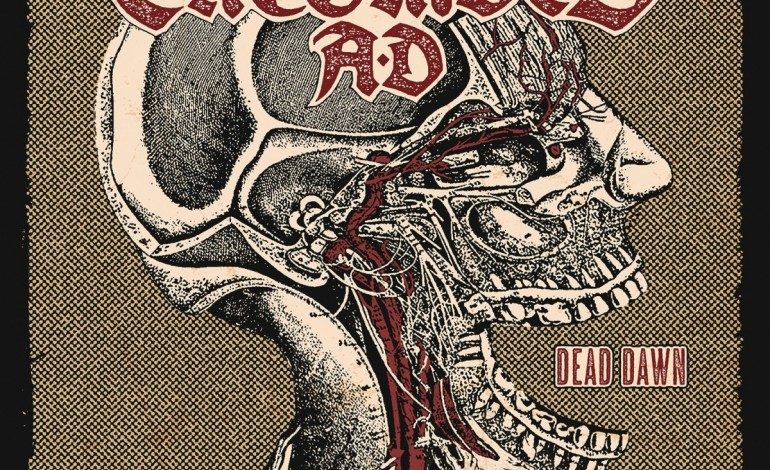

Abnormally Desist (from using the Entombed name)
Every so often a great visionary emerges, one who is demonstrably and blissfully ahead of their time. However, these visionaries are often afflicted by a slow and inescapable curse – the curse of having the times catch up to them, and eventually pass them by. Swedish band Entombed delivered rapturous glimpses of the death metal future on two non-consecutive occasions. Firstly, with their monolithic 1990 classic Left Hand Path, which combined a revolutionary “buzzsaw” guitar tone with occult, morbid lyrics, heavy brooding (during the slow parts) and youthful energy (for the fast parts) to mint an enduring “Swedish death metal” style. Entombed’s other masterstroke came in 1993 with Wolverine Blues, which combined the hairy-chest, leather-vest manliness of American motorcycle blues rock with the melodicism vs. big crunch morbidity of Scandinavian death metal – to invigorating effect. Death ‘n’ roll was born, and all these years later, that founding document still abounds with vitality.
Incorporated in 2014, Entombed A.D. is a spin-off of Entombed, which essentially finalized the divorce of founding members Lars-Gӧran Petrov (vocals) and Alex Hellid (guitar). The A.D. version of the band, featuring Petrov and his droogs, has released two albums, 2014’s Back to the Front, and 2016’s Dead Dawn, which is the subject of this review.
There is a certain variety of middle-aged death metal that pops up every now and then, usually resting its meaty forearms on a big stack of scene bona fides. Much of this music comes from Florida, and announces itself with words like “legendary,” “Kam Lee,” “Chris Barnes” and “Morbid Angel.” There is also the inevitable mention of some early incarnation of Chuck Schuldiner’s Death. Entombed A.D. are from a completely different scene, but their latest is spiritually in line with the Florida stuff. That is: straightforward but competent death metal, containing decent riffs, seasoned vocals, generically dark lyrics and some push and pull between fast thrashy passages and slow ominous churn. At best, it’s fun, comforting, carefree stuff. At its worst, it’s yawn-inducing pabulum, unsurprising and flat.
Dead Dawn struggles to raise itself from the stagnancy of the latter. This is odd, because the ingredients here are remarkably similar to those in the heyday jams from Left Hand Path and its follow up Clandestine. There is just some volatile essence missing – an energy, sense of innovation, sharpness, flair, attitude… those intangibles that make the jaw clench and the head bang. Opener “Midas in Reverse” jumps out of the gate with some catchy vitality in its grizzled visage, but do we really need any more of this sound in 2016? It just doesn’t seem necessary. The redundant mire only thickens with primitive clunkers like “Down to Mars to Ride” and “The Winner has Lost.”
Some of the flatness is a result of the individual musicians failing to stand out. Sure, Nico Elgstrand has some nice guitar solos, but nothing to write a Metallum rave about. Drummer Olle Dahlstedt is good, but he’s sort of the Alan White to Nicke Andersson’s Bill Bruford. L-G Petrov’s voice has aged, but not badly. Nowadays he sounds like Linus Jägerskog from Swedish band Burst, delivering a gruff death bellow with intelligible lyrics and some discernible tone variation (especially in “Hubris Fall”). One just wishes Petrov had more interesting compositions to bellow over, or more intriguing lyrics to bellow…
There are some fun moments on the album, and they arrive when Entombed A.D. ham it up a bit. The fancy, epic riffage toward the end of “Dead Dawn,” for example. Or the way “Total Death” sounds like Motӧrhead, down to the pick-slide and subsequent fast-twangin’ guitar solo toward the end. “Black Survival” musters some energy during its more frantic moments, and “Not What It Seems” at least offers a different feel with its Christmas-y, pseudo-neoclassical guitar lines.
It can be fun to play the game of “what disparate-yet-influential albums were released at about the same time?” In this round, Wolverine Blues hit the shelves of Tower Records about a month before… “Shaolin shadowboxing, and the Wu-Tang sword style. If what you say is true…” Yep, Enter the Wu-Tang (36 Chambers). These albums are not so unrelated! Robert Diggs – AKA Prince Rakeem, AKA Bobby Digital, AKA RZA – is also a visionary whose times caught up with him. If he sat down with Lars-Gӧran Petrov, perhaps they would talk excitedly about new and recent projects, both pretending that they aren’t both subsisting, to some extent, on well-earned goodwill from their more ingenious days. Or maybe the barriers would come down, and they would admit that their glory days are likely behind them, and that they each had good runs, and that their later work is not a cash-grab – but rather a reflection of the genuine love they still have for their craft. If only the music industry would allow them to admit as much to the consumer. Instead someone, whether it be the artists themselves, or the label, or the music press, will be trying to pull the wool over our eyes, to fool us into thinking this new and mediocre material has any relevance outside the camps of loyalists that the artists have already amassed.
